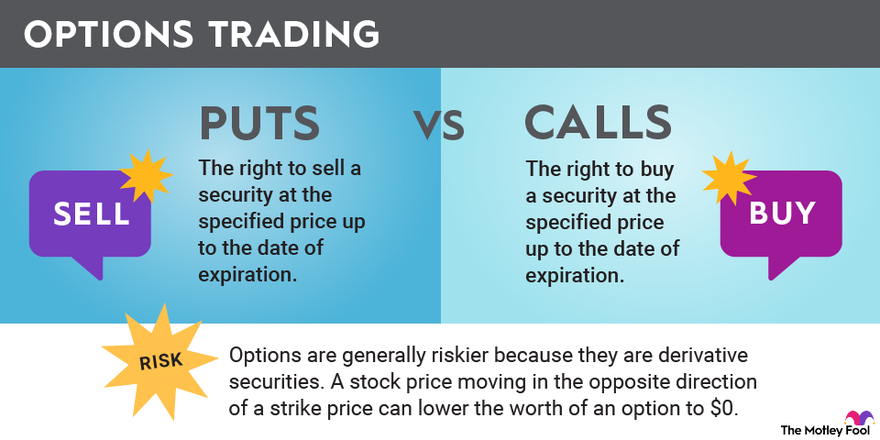Options trading, often considered the realm of Wall Street magnates, offers immense potential for savvy investors willing to delve into its complexities. An option, in essence, bestows upon the holder the right, but not the obligation, to either buy (call option) or sell (put option) an underlying asset, such as a stock, at a predetermined price within a specified time frame.

Image: www.fool.com
While the concept may seem daunting at first, understanding the nuances of options trading can empower you to navigate market fluctuations and potentially enhance your returns. So, fasten your seatbelts and embark on this journey as we dissect what options are, how they work, and how you can harness their power in the stock market.
Unveiling the Essence of Options
An option is akin to a contract that grants the holder the privilege, not the compulsion, to engage in a specific transaction. The underlying asset can be a stock, bond, commodity, or even a currency. The agreement specifies a strike price, which represents the pre-agreed-upon price at which the buyer can buy or sell the asset.
Crucially, this right comes at a price called the premium. The premium encompasses the value of the option, influenced by factors like the underlying asset’s volatility, time to expiration, and interest rates.
Call Options: A Bullish Outlook
Call options are employed when investors anticipate an upward trajectory in the underlying asset’s price. By purchasing a call option, the holder gains the right to buy the asset at the strike price on or before the expiration date. If the market price of the asset surpasses the strike price, the call option can be exercised to purchase the asset at a profit.
Put Options: Navigating Downturns
Put options, on the other hand, are favored when investors foresee a decline in the underlying asset’s price. With a put option, the holder acquires the right to sell the asset at the strike price on or before expiration. If the market price dips below the strike price, the put option can be exercised to sell the asset at a profit.

Image: www.pinterest.com.mx
Expert Insights and Practical Tips
Seasoned traders emphasize the importance of understanding the risks associated with options trading. It’s crucial to meticulously research the underlying asset, monitor market trends, and carefully consider your financial situation before venturing into options.
Moreover, experts recommend starting with small trades to gain experience and gradually increasing the size of your positions as you acquire confidence. Seek guidance from experienced professionals, study historical data, and always remember that options trading involves potential losses, so never invest more than you can afford to lose.
Unlocking the Potential, Navigating the Risks
Options trading can be a double-edged sword, offering both opportunities and risks. By comprehending the intricacies, leveraging expert insights, and exercising prudence, you can harness the power of options to potentially amplify your returns.
Remember, financial markets are inherently volatile; therefore, it’s imperative to manage your risk exposure effectively. Embrace calculated decision-making, continually educate yourself, and never let emotions cloud your judgment.
What Is An Option In Stock Trading

Image: www.rockwelltrading.com
Conclusion
The world of options trading awaits exploration, but it is essential to approach it with a discerning eye. By embracing a thorough understanding of options, their functions, and the associated risks, you can navigate the complexities of the financial markets with greater confidence.
Whether you’re a novice investor eager to expand your horizons or a seasoned professional seeking to deepen your knowledge, this comprehensive guide provides a roadmap to harness the power of options and unlock the potential for financial growth.






